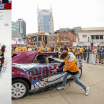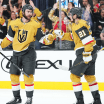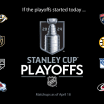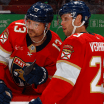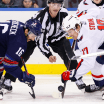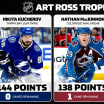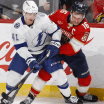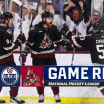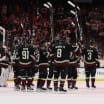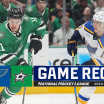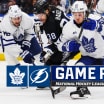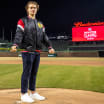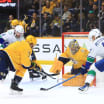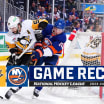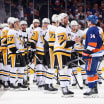PROVIDENCE, R.I. -- The four officials slumped on folding chairs in a cinderblock room. Exhaustion was on their faces as they stripped off their gear, sweat having pooled on their skin. On a table sat protein bars and other necessities: towels and Arrid Extra Extra Dry deodorant.
NHL officials of future sought by roving evaluators
League managers who are part scout, part coach work with hopefuls in minor leagues
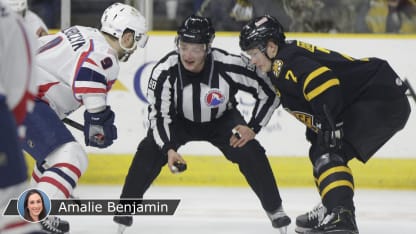
Soon after they were seated, though, getting a much-needed few minutes of rest, they were up again, gathered around Chris Edwards and his iPad.
Deep within the Dunkin' Donuts Center, the home rink of the Boston Bruins' American Hockey League affiliate, the officials gathered minutes after they had finished working a Sunday afternoon game between Providence and Springfield. It was time to learn.
"I haven't got much here, guys," said Edwards, an NHL officiating manager, as he activated the iPad and scrolled through the eight clips he had taken from the broadcast of the game.
"There was a penalty at the end of the first period there, single penalty to Springfield 26," Edwards said of a roughing call on Bobby Farnham at 19:16. "I think it was a good call. It did a lot to settle things down, I think. Because they were starting to get in scrums all the time, almost every whistle.
"Did you warn the bench?"
Mitch Dunning, one of the two referees and a member of the NHL minor league staff, said he had.
"I talked to both benches at the start of the second," he said. "Saying, 'I don't [care] what happened in the first, but the late hits and the stickwork behind the play, they're done. We're going to address them right now.'"
Edwards nodded his approval.
"I was just wondering because that came at a good time," he said. "You followed through with it. That's what needed to happen there."
The conversation took 12 minutes, with the four officials huddled around Edwards and his screen as they went over clips of the game. Some of Edwards' comments were affirmations of their decisions. Some were questions about their thought processes, their goals in making a call or in kicking a player out of the face-off circle. Some were gentle reminders of the NHL standard for penalties.
It's how NHL officiating managers spend their days throughout the regular season, touring the burgs of the lower leagues, making their way through Tier II games in Quebec, ECHL games in Orlando, Florida, and AHL games in Wilkes-Barre, Pennsylvania. Edwards usually spends Wednesday through Sunday on the road, driving or flying from his home in Belleville, Ontario, to games where he can focus his eyes on the men in stripes.
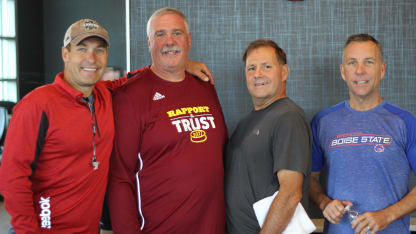
NHL officiating manager Chris Edwards (second from l.) is working with (from l. to r.) senior vice president & director of officiating Stephen Walkom, director, officiating career development Paul Devorski and senior manager, officiating Rob Shick to find the next way of NHL referees and linesmen.
"Really, what we're doing is no different than what the coaches are doing at this level," Edwards said. "They're showing video. They're talking to [the players] about whatever it is, their system or whatever they're doing. So our job is really a combination of a scout and a coach."
He is looking for the next generation of NHL officials. He is teaching the next generation of NHL officials.
\\\\
Some of the AHL officials work sporadically, a few games at this level, more in lower leagues or college. Some of them, though, are on the radar of the NHL, necessitating frequent looks from the League officiating managers, as well as evaluation and instruction, so that when there's an opening at the highest level in the world, they might be ready.
Tyson Baker and Dunning are two of them.
Baker, a linesman, and Dunning are minor league officials in NHL parlance, working their way up, ready in case of a retirement or departure from the current NHL staff. There might be one or two of those each season -- in addition to injuries that require part-time replacements -- and the NHL needs to be prepared.
That's why Edwards does this.
An employee of NHL Central Scouting for about 25 years, and an official for a decade in juniors, Edwards has spent much of his life on highways and in airports, his bags full of Marriott hotel pens and his suitcases well-worn. The 48-year-old used to seek out the next generation of players, evaluating talent from afar, rarely talking to the teenagers whose lives he might have an impact on.
It's much more hands-on now. Edwards, who became an officiating manager in 2014, develops relationships with the officials and massages their understanding of the rule book and NHL standards, gently prodding them to answer in these postgame sessions. He has an avuncular way about him, full of good cheer and helpfulness, and it's easy to see how the officials would cotton to him, understanding that he wants them to get better. Their success, after all, is his.
"It's not a lot different," Edwards said of his current position compared to his time with Central Scouting. "The job is still the same. Your job is to evaluate, project and figure out who you think are going to be good NHL officials. You'll sit with your charts, look at your game reports, and do your list up, and it really is no different than what you're doing with players."
That's especially important with the current move in officiating toward new streams of talent, targeting former players. It has been a focus at the NHL Exposure Combine in the offseason and in recruiting, as NHL director of officiating Stephen Walkom and his crew try to find officials that can keep up with the rapidly increasing pace of the game.
It means that more officials are working at higher levels without coming up through the lower ranks, through mites and bantams and juniors. More officials in the pipeline have the physical tools, but more are also learning on the fly, which makes the job of Edwards and the other officiating managers increasingly important.
"What I find (is an issue) with the newer guys -- the guys who are right out of playing, which we've got a lot of right now -- is positioning with them," Edwards said, sitting in the scouts' box at the arena while the action went on below him. "One of the things that's happening with them is they're all such good skaters that they think they need to fight their way through traffic all the time and you'll see them, say, down in the corner and instead of just standing still, they'll try and fight their way to get to the net and they'll end up just panicking and spinning around. They've been coached since they were little kids, don't stand around in your own end.
"The other one you'll find [with] former players is that as soon as the whistle blows they'll drop their head and they'll make a loop like they're heading for a line change, where you can't do that. Like right there."
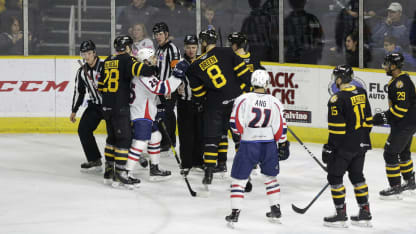
Edwards pointed out Dunning.
"Mitch turned his back on those guys on the benches."
He will mention the point to Dunning later, after the game.
"It's difficult," he continued. "People will say, 'Well, he's played the game, so he's got a feel for it.' You've still got to learn how to officiate. We all learned how to do that in peewee or bantam or lower, when you started. We say to the guys, you're trying to figure this out at the second-highest level in the world. It's going to take some time."
\\\\
The scouts' box above Section 103 at Dunkin' Donuts Center was sparsely populated on a Sunday in January. The men there, a couple of them from the Florida Panthers staff, wore suits. Edwards took his seat in the front row and armed himself with a notebook, that ever-present iPad, and purple and green highlighters, a makeshift system since his pen stopped working that morning.
Edwards had been in Springfield the previous day for a game against Providence, watching the same two teams, which allowed him a rare chance to see the carryover from one game -- and one set of grievances -- to another. He also got to see whether his lessons had sunk in.
"Like if you talk to them about something positionally, you want to see them not making the same mistakes all the time," he said. "Tonight, really, I've got nothing in my head other than seeing how they react to back-to-back games.
"You have to react to them the way the team's going to -- if the teams are going to come out and they're mad at each other from last night, how do you deal with that? How much rope -- do you put a stop to it right away, or do they allow it to keep going and get out of hand? Do they overcall it?"
Edwards said that in prior years, if things got chippy in the first of back-to-back games between the same two teams, there might have ended up being "a war" the next day. But things are different, and Edwards can go weeks without seeing so much as a fight on the ice now.
As the warmups commenced, Edwards reflected on what the officials were doing at that moment, going over the rosters, getting their bearings about what the game might entail.
But there's such a thing as too much of that, too. He doesn't want them to overcall games in which the situations don't warrant it or penalize teams for something that's expected -- but that doesn't actually occur.
"You've got to react to what's happening," he said. "And you've got to be prepared."
He's working on massaging their understanding, of when to step in, of when not to. It's something that takes years of experience, reams of games, a feel for the ebbs and flows of hockey. It's not easy or simple.
"Sometimes knowing when to stay the [heck] out of the way is just as important. And that's knowing the game, reading the play," Edwards said. "There's no easy games. If a game is routine, it's knowing when to get involved, and were you good when you needed to be good?"
\\\\
The NHL employs 34 full-time referees and 34 full-time linesmen. There are an additional 10 minor league referees, including Dunning, and four minor league linesmen, including Baker. That's not a lot of jobs to go around, especially when the NHL loses only one here, one there each season.
Next season will bring at least one referee opening, with 57-year-old Brad Watson set to retire. Dunning is probably too green to be considered, but Walkom and company will look at officials like Furman South, Peter MacDougall, and Reid Anderson; each is on the minor league staff and splits his time between the NHL and AHL.
"We give our opinions on who we believe should be hired and then Stephen makes the decision," Edwards said. "That's really no different than the scouts and GMs. You go into your scouting meetings, you have your list of guys that you want and when it comes to draft day, the organization goes [in a different direction] or the guy's not available. You always think you're prepared for it, but things happen."
At that moment, though, Edwards' focus was on smaller matters; the game finally ended with one second remaining in overtime, on a goal by Springfield forward Dryden Hunt.
He gathered his things, his notebook and iPad, and wound his way through the concourses and down the stairs to the arena level, finding his way to that unassuming cinderblock room that serves as the officials' space.
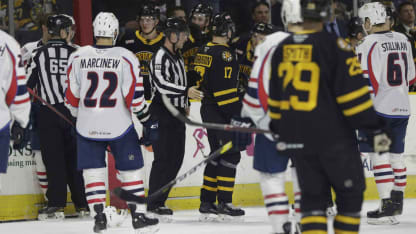
Edwards had eight clips in his iPad -- conveniently saved to his photos, enabling him to play them back without worrying about finicky arena Wi-Fi -- though he usually averages about 10 in a game. Not that they're always negative. Sometimes Edwards wants to show the officials their own improvement, something he's mentioned on a previous visit that he's now seen corrected, like better positioning or better work on face-offs. He wants to reinforce the concepts in those cases.
But some things he does need to address.
"OK, Mitch," Edwards said. "The sightline on this play at the net. Now I knew because we were sitting up in that corner that the puck leaked through his pad there. You see where you're coming from?"
"A little deeper?" Dunning said.
"I want to see you attack the net on that one," Edwards said. "It came out between his legs. Right there -- you see that, Springfield No. 8?"
"He's pushing it back in," Dunning said.
"That puck was loose," Edwards said. "Now, you're not seeing it because you're there. You're not in a bad spot. But I think on that play there you want to attack the net more."
He moved on, to face-offs, with Baker. He believed, in one instance, they could have gotten the puck down in the five-second window. He made suggestions, corrections. He advised and taught. He finished the last clip and brought the iPad down.
"That's all, guys," he said.
The officials thanked him.
"That was well-handled, you guys," he said. "You had to officiate at the beginning of the game. You handled the scrums and got involved when you need to. And you let them battle."
It was a good game, they agreed. It was fun.
"It doesn't happen all that much," Edwards said.
He didn't have time for much more. It was getting late, and he had a flight out of Boston Logan International Airport at 9 p.m. He was heading home that evening, but he would be back out on the road a few days later in Laval, Quebec, watching more hockey, teaching more officials.
Edwards walked out through the loading dock, toward the January cold, iPad tucked away, ready for the next game.


